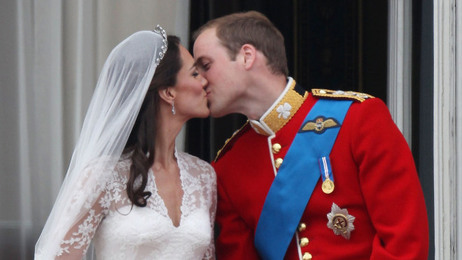
Enlarge Peter Macdiarmid/Getty Images
April
29, 2011: Their Royal Highnesses Prince William, Duke of Cambridge and
Catherine, Duchess of Cambridge kiss on the balcony at Buckingham Palace
after their wedding.
April
29, 2011: Their Royal Highnesses Prince William, Duke of Cambridge and
Catherine, Duchess of Cambridge kiss on the balcony at Buckingham Palace
after their wedding.
"Sons and daughters of any future U.K.
monarch will have equal right to the throne" under royalty succession
reforms agreed to today by all 16 Commonwealth countries, the BBC reports.
And
under the new rules, British kings and queens will no longer be banned
from marrying Roman Catholics — though the rule barring a Catholic from
becoming king or queen will remain.
The
reforms are not to be applied retroactively, and the next two in line
behind Queen Elizabeth II (Prince Charles and his son, Prince William)
are both first borns. But if the first child born to William and Kate —
the Duke and Duchess of Cambridge — is a girl, she would be the heir to
the throne, assuming her father one day becomes king.
Earlier this month on All Things Considered, Economist political
editor David Rennie said there doesn't appear to be any opposition to
the changes in Britain — where legislation still needs to be passed to
make them effective. But, he added, "most people are worrying about the
financial crisis. They're worrying about their mortgage. It's kind of
beside the point."
Now seemed to be the
time to make the change, he said, because "clearly, now we've got a
young couple who just got married [William and Kate]. Assuming that
biology works the same way for royals as it does for everyone else, it's
time to get on with working out what to do next."
The Daily Mail this morning does some "what if" reporting that looks at how different things might have been if the new rule had always been in effect:
"If
the new rules had been in force in 1509, Margaret Tudor would have
taken the throne instead of Henry VIII. That could have meant the
Reformation would never have taken place and Elizabeth I would never
have been Queen.
"If the practice had
been changed as recently as the last century, Britain could have had
two Queen Victorias back to back. Princess Victoria, the Princess Royal
would have acceded to the throne in 1901 instead of King Edward VII.
"When
she died just a few months later, her son Kaiser Wilhelm II [the last
German emperor] would have ascended the throne — something which could
have prevented the First World War."
https://www.npr.org/blogs/thetwo-way/2011/10/28/141789347/british-princesses-to-be-equal-to-princes-in-line-of-succession?sc=fb&cc=fp


